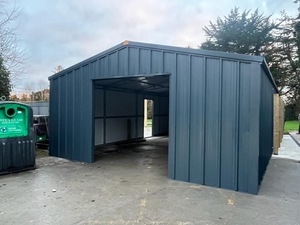How to Design an Efficient and Functional Workshop Shed in Christchurch
Cuerpo
Whether you’re running a business or indulging in personal DIY projects, having a well-thought-out space can boost productivity, organisation, and safety. If you’re planning to build a workshop sheds in Christchurch, there are several key considerations to keep in mind.
1. Define Your Workshop Needs
The first step in designing a functional workshop shed is to clearly define your needs. Consider what you plan to use the shed for. Are you running a carpentry business, an automotive repair shop, or using it for home-based crafting? Identifying your primary tasks will help you make decisions about layout, size, and equipment requirements.
For example, a woodworking shop requires plenty of workbenches, storage for tools, and ample space for cutting and assembling, while a mechanic’s workshop may need specific areas for car lifts, parts storage, and workbenches. Understanding your unique needs from the start will help avoid costly mistakes later in the design process.
2. Plan for Adequate Space
When designing a workshop shed, space is critical. A cramped, cluttered environment can stifle creativity and productivity, so it’s important to plan for sufficient room for both equipment and movement. If possible, allocate separate areas for different tasks. For instance, you might have one section for heavy machinery and another for delicate tasks that require a cleaner environment.
To ensure your shed is large enough, take inventory of the tools and equipment you will use and measure their size. Always plan for extra space in case you expand your operations or acquire additional tools in the future.
3. Consider Lighting and Ventilation
Good lighting is a non-negotiable aspect of any workshop. Whether you’re cutting materials or performing intricate repairs, being able to see clearly is essential. Ideally, your workshop shed should have a combination of natural light, such as windows or skylights, and artificial lighting. Task lighting directly over work areas can also help reduce shadows and ensure precision in your work.
In addition to lighting, proper ventilation is crucial for maintaining air quality. Workshops can often accumulate fumes, dust, or vapours, depending on the materials being worked with. Therefore, include windows or vents that can be opened to let fresh air in and clear out any harmful air. In some cases, installing a mechanical ventilation system might be necessary to ensure airflow, especially if you're working with hazardous substances.
4. Storage Solutions and Organisation
A cluttered workspace can quickly turn into a chaotic and unsafe environment. To ensure that your workshop remains organised and efficient, plan for adequate storage. Shelving units, pegboards, and storage cabinets are perfect for storing tools and materials in an orderly manner. Additionally, make sure the layout encourages easy access to frequently used items.
Consider modular storage systems that can be adjusted or expanded as your needs change. A well-organised workspace allows you to spend less time searching for tools and more time on productive work. Include designated spaces for larger items, such as machinery or raw materials, so that everything has its place.
5. Electrical and Safety Considerations
For most workshops, access to electrical outlets is essential. Make sure to plan for an adequate number of outlets and ensure they are positioned in practical locations for tool use. Consider the power requirements of your tools when deciding on the number and placement of outlets. Also, be sure that the wiring is installed to meet New Zealand’s electrical safety standards, which will help prevent any accidents.
In terms of safety, your workshop shed should be equipped with the necessary precautions, such as fire extinguishers, smoke detectors, and first aid kits. If you plan on using hazardous materials or machinery, ensure that your workshop is fitted with safety features such as dust extraction systems or protective barriers.
6. Choose the Right Materials
The materials you choose for your workshop shed will directly affect its durability, comfort, and safety. Steel is one of the best materials for constructing a workshop shed due to its strength, low maintenance, and long lifespan. Steel sheds are also highly resistant to fire, rust, and pests, making them ideal for a range of environments.
A steel shed provides the sturdiness required to handle heavy-duty equipment while offering minimal maintenance needs over time. Steel also has excellent insulating properties, helping to regulate temperature and reduce noise levels within the shed.
Conclusion
Designing an efficient and functional workshop shed requires careful consideration of your specific needs, available space, lighting, ventilation, and storage requirements. By planning thoroughly and choosing high-quality materials like steel, you can ensure that your workshop shed will serve you well for years to come. With the right design, your workshop shed in Christchurch can become the ideal environment for productivity, safety, and creativity.
For expert advice and assistance in designing your workshop shed, visit Durasteel Workshop Sheds, where you can get tailored solutions that meet your unique requirements.









Comentarios